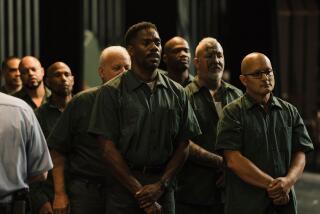The Screen Trade
Regarding your Film Clips item âA Killer Script From San Quentin,â by David J. Fox (May 29):
Of the 170 screenplays submitted for competition to the Writers Workshop in 1993, only seven were awarded showcase presentations. Of those seven, only two were deemed of sufficient quality to be circulated to the studios. San Quentin inmate Kenneth Gay was one of the two writers.
I was the other.
My winning screenplay, âKilling Time,â is about a murderer but was written by someone with no criminal record and who would find it very difficult to load a rifle to hunt game. I am a simple, decent citizen who pays taxes, votes, works full time and tends to my family. In my spare time I write movies.
To date my telephone has not rung, no one has requested an interview, nor has my photo appeared in Calendar.
I understand life is unfair, particularly life in Hollywood, but this is the second time Calendar has covered a Writers Workshop screenwriter with a criminal record. The first was J. B. Mackey; he had two articles written about him in April, 1987.
It would seem that being a blue-collar worker in the trucking industry with no formal education in screenwriting is not as far removed from Hollywood as making license plates in prison and therefore is not enough of a âhookâ for Calendar to cover.
I guess my struggles and sacrifices and the odds Iâve beaten (168 other screenwriters) are just too boring for the media. But I can live with that. Because I can still write exciting movies without having a criminal record or taking a human life.
LARRY WHATCOTT
Mission Viejo
*
Thanks for printing the latest chapter of âInsight Into the Hollywood Ego (Gone Rampant).â Except this one, owned by flavor-of-the-month Robin Swicord, really gave new meaning to the term self-aggrandizement (âHereâs a Screenwriter Who Strives to Give Women a Real Voice,â by Vera Dika, Film Clips, May 29).
Iâll be the first to admit that parity in the fair representation of the sexes in the film and TV industry is not completely there yet. But to listen to Swicord, youâd think she were the first one to come along with the desire and ability (not to mention, razor-sharp insight) to represent modern women realistically and fairly in the film medium.
This is an insult to other female writers and directors in this industry--from Martha Coolidge to Nora Ephron to Jane Campion--who, viewed together, have already produced an impressive body of work to date, that if nothing else certainly succeeds in giving voice to several modern womenâs points of view.
In the closing segment of the article, a final quote appears that pretty much seems to typify the condescending attitude Swicord maintains throughout the piece. She proudly states: âThat is what Iâm after. It is time to say, of course, women are enjoyable to look at, but we also have voices, desires and an inner life.â
Iâd have to say that on the scale of pseudo-profundity, that oneâs gotta rate a resounding duhhhhh! Ya know, Robin, I never even dreamed.
AARON GOLD
Pasadena
More to Read
Only good movies
Get the Indie Focus newsletter, Mark Olsen's weekly guide to the world of cinema.
You may occasionally receive promotional content from the Los Angeles Times.










